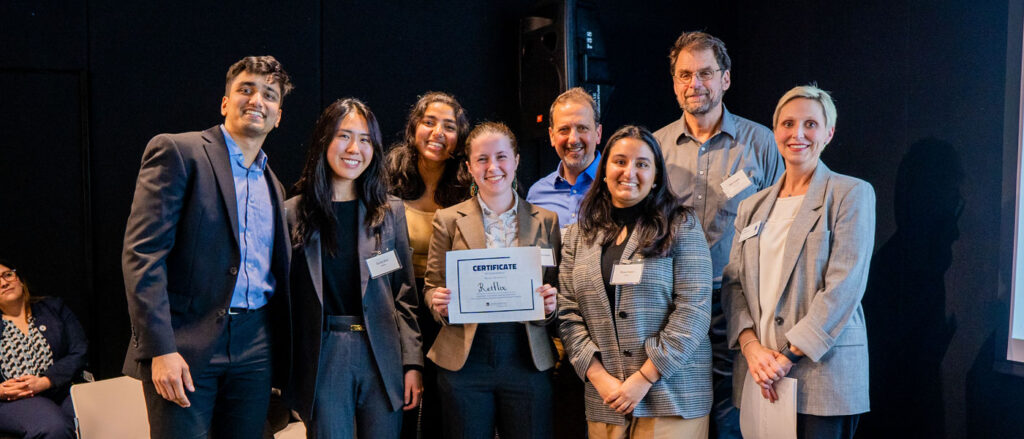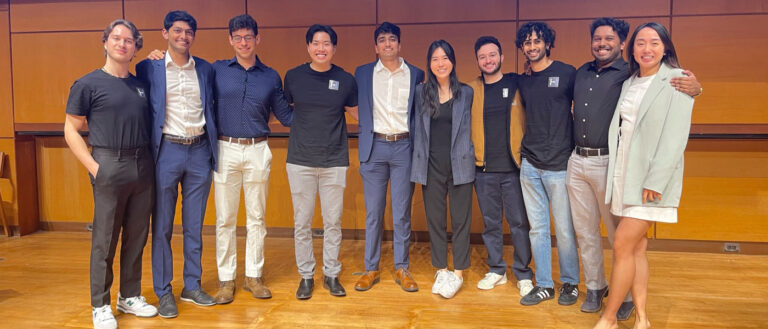When second-year medical students Elliot Crooks and Yvette Zhu met each other at an MDplus chapter event focused on innovation and entrepreneurship in healthcare, they immediately bonded over a specific observation: Where were all the non-medical students?
The lack of disciplinary diversity didn’t necessarily come as a surprise—MDplus is a national student organization specifically for medical students and aspiring physician-innovators, after all—but seeing that group in a room talking about innovation seemed to shift something for Zhu.
In the meeting, the group started talking about areas in healthcare that need to be improved, and how to do so.
Zhu’s suggestion? “Why don’t we bring together people from engineering, from law, from business, from all different types of backgrounds together in one room, and work on those problems together?”
Crooks, who had never met Zhu before, was on board immediately.
“There’s really no reason why a nursing student, a medical student and a business student aren’t collaborating together to create something that’s useful for the patient,” he explained.
A novel approach
When working on creating a product or service for a hospital and for patients, there are many elements to consider beyond the clinical solution. Legalities, regulatory considerations, financial or business decisions, and specific technical needs like a bespoke software program are common concerns.

“Having that single point of view from only medical students,” Crooks recalled regarding what initially brought him into collaborating with Zhu, “was not necessarily […] the best approach to creating.”
Within a week, the new friends got to work and co-founded HyperCase. Soon after, the founding team expanded to 12 like-minded and passionate medical students, a board of expert advisors, and a faculty advisor in adjunct professor Joseph Jankowski, senior advisor for innovation and economic development in the Office of the Senior Vice President for Research.
“We spent a lot of time building a team of […] ambitious students [who are] independent and interested in being collaborative,” said Crooks.
Hands-on experience
Now in its second year at Case Western Reserve, HyperCase is a student-led multidisciplinary incubator that focuses on addressing clinical needs in healthcare. Its members are put into groups of 4-6, who then are connected to hospitals like Cleveland Clinic to identify problems that have the opportunity for meaningful interdisciplinary solutions.
Experts are brought in as needed, and HyperCase capitalizes on connections through CWRU faculty members such as Michael Goldberg, associate vice president and executive director of the Veale Institute for Entrepreneurship, who can connect teams with mentors in their areas of focus.
One such mentor was Justin Bellante (CWR ’01), founder and former CEO of BioIQ, the first digital platform for at-home health testing for early disease detection, which was recently acquired by LetsGetChecked. Bellante mentored the team for VoxCor, an innovative solution that aims to provide clinicians with a tool for early diagnosis and improved monitoring of congestive heart failure.
“[Bellante] really encouraged us,” said Katelyn Vlastaris, a second-year medical student on the VoxCor team who serves as an outreach and recruitment officer at HyperCase.
“Getting that confirmation from someone who has gone through [CWRU] and is an alumni, who already walked this path, to look at my team and look at our idea and say, ‘You can do this, and you need to keep pushing,’ I think was the moment where it really started to feel real.”
“We were entrepreneurs.”
VoxCor also includes medical student Millan Patel, mathematics and computer science major Andrew Ye, and MBA candidate Matthew Glaros. Last year, the team was awarded $1,000 and second place in the research track for the Morgenthaler-Pavey Startup Competition.
Vlastaris said that now that she’s had a chance to participate in the first year of HyperCase, she can easily describe the experience to recruitments when working in her officer role.
“You are going to have the opportunity to compete in startup competitions at CWRU in think[box], and those are unbelievably valuable,” she explained. “You’re going to gain skills. You’re going to gain accomplishments. This is a very valuable club to be a part of.”
Since its inception, that high-value outcome was at the heart of HyperCase’s mission. Co-presidents Zhu and Crooks, as well as the rest of the leadership team, have been working hard toward building an impactful organization for innovation that truly walks the walk.
Looking ahead
“We have really created a curriculum to guide you and teach you through different phases of innovation,” said Zhu. “How to come up with an idea, how to test out an idea […] How to really make something from nothing to be able to solve a problem in healthcare.”
“We welcome anyone and everyone who wants to create, who wants to make a difference in the healthcare space.”
The team behind VoxCor is now working toward becoming an LLC and developing their idea into a product. It could very well turn into a revenue-generating startup company. And it’s that sort of exciting result that is driving the officers of HyperCase to continue promoting the club.
If you’re interested in learning more about HyperCase, you can join their CampusGroups page to get on their mailing list, or fill out an application to be on a team.
Want to hear from the HyperCase team? Take a look at a video on the CWRU Veale Institute for Entrepreneurship’s Instagram page.

